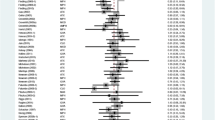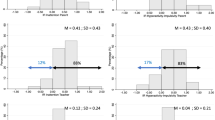Abstract
Although much has been written about the agreement of parents and teachers regarding the diagnosis of attention-deficit/hyperactivity disorder (ADHD), some uncertainty remains about their agreement when assessing change during drug treatment. To address this issue, we analyzed data from a placebo-controlled short-term study and an open-label long-term study of ADHD children treated with OROS® methylphenidate (MPH). Both reporters agreed that OROS® MPH was efficacious for symptoms of inattention/overactivity and oppositionality/defiance and that the effect was greater for inattention/overactivity than oppositionality/defiance. Thus, in clinical trials, having two reports may not be absolutely essential for assessing the efficacy of ADHD medications. We also computed diagnostic efficiency statistics and found a high probability that parents would confirm teacher reports of therapeutic improvement and a somewhat lower probability that teachers would confirm parent reports of therapeutic improvement. In contrast, neither reporter was likely to confirm the other reporter’s report of no improvement or worsening. Thus, when given a report of no improvement from one setting, clinicians cannot be certain about clinical status in the other setting. For symptoms of oppositionality and defiance, we also saw that parent- teacher agreement about improvement was better than agreement about lack of improvement. However, for these symptoms, teacher reports were somewhat better predictors of parent reports than vice-versa.
Similar content being viewed by others
References
Achenbach TM, McConaughty SH, Howell CT (1987) Child/adolescent behavioral and emotional problems: implications of cross-informant correlations for situational specificity. Psychol Bull 101(2):213–232
Achenbach TM (1991) Manual for the Child Behavior Checklist/4–18 and the 1991 Profile. Burlington,VT, University of Vermont Department of Psychiatry
American Academy of Pediatrics (2000) Clinical Practice Guideline: Diagnosis and evaluation of the child with attention-deficit/hyperactivity disorder. Pediatrics 105(5):1158–1170
Arnold LE, Jensen PS (1995) Attention-deficit disorders. In: Kaplan, Sadock BJ (eds) Comprehensive Textbook of Psychiatry. 6th edn. Lippincott Williams and Wilkins, pp 2295–2310
Barkley AR (1990) Attention-Deficit/Hyperactivity Disorder: A Handbook for Diagnosis and Treatment. New York: Guilford Press
Barkley RA, Guevremont DC, Anastopoulos AD, Du Paul GJ, Shelton TL (1993) Driving-related risks and outcomes of attention deficit hyperactivity disorder in adolescents and young adults: a 3- to 5-year follow-up survey. Pediatrics 92(2):212–218
Barkley RA, Murphy KR, Kwasnik D (1996) Motor vehicle driving competencies and risks in teens and young adults with attention deficit hyperactivity disorder. Pediatrics 98(6 Pt 1):1089–1095
Biederman J (2002) Comparing teacher and parent reports of ADHD in clinical trials. Presented at the 49th Annual Meeting of the American Academy of Child and Adolescent Psychiatry, San Francisco, October 22–27
Biederman J, Keenan K, Faraone SV (1990) Parent-based diagnosis of attention deficit disorder predicts a diagnosis based on teacher report. J Am Acad Child Adolesc Psychiatry 29(5):698–701
Biederman J, Faraone SV, Milberger S, Doyle A (1993) Diagnoses of attention-deficit hyperactivity disorder from parent reports predict diagnoses based on teacher reports. J Am Acad Adolesc Psychiatry 32(2):315–317
Biederman J, Mick E, Faraone SV, Braaten E, Doyle A, Spencer T, Wilens TE, Frazier E, Johnson MA (2002a) Influence of gender on attention deficit hyperactivity disorder in children referred to a psychiatric clinic. Am J Psychiatry 159:36–42
Biederman J, Lopez FA, Boellner SW, Chandler MC (2002b) A randomized, double-blind, placebo-controlled, parallel-group study of SL381 (Adderall XR) in children with attention-deficit/hyperactivity disorder. Pediatrics 110(2 Pt 1):258–266
DHHS, US Department of Health and Human Services (1999) Mental Health: A Report of the Surgeon General. US Department of Health and Human Services, Substance Abuse and Mental Health Services Administration, Center for Mental Health Services, National Institutes of Health, National Institute for Mental Health: Rockville, MD
Faraone SV, Biederman J, Spencer T, Wilens T, Seidman LJ, Mick E, Doyle AE (2000a) Attention-deficit/hyperactivity disorder in adults: an overview. Biol Psychiatry 48(1):9–20
Faraone SV, Biederman J, Feighner JA, Monuteaux MC (2000b) Assessing symptoms of attention deficit hyperactivity disorder in children and adults: which is more valid. J Consult Clin Psychol 68(5):830–842
Faraone S, Biederman J (2002) Efficacy of Adderall for attention-deficit/hyperactivity disorder: a meta-analysis. J Atten Disord 6(2):69–75
Goyette CH, Conners CK, Ulrich RF (1978) Normative data on revised Conners Parent and Teacher Rating Scales. J Abnorm Child Psychol 6:221–236
Greene RW, Biederman J, Faraone SV, Monuteaux MC, Mick E, DuPre EP, Fine CS, Goring JC (2001) Social impairment in girls with ADHD: patterns, gender comparisons, and correlates. J Am Acad Child Adolesc Psychiatry 40:704–710
Loeber R, Green SM, Lahey BB, Stouthhamer-Loeber M (1991) Differences and similarities between children, mothers, and teachers as informants on disruptive child behavior. J Abnorm Child Psychol 19:75–95
Loney J, Milich R (1982) Hyperactivity, inattention, and aggression in clinical practice. In: Wolraich M, Routh DK (eds) Advances in Developmental and Behavioral Pediatrics. Greenwich, CT, JAI Press, pp 113–147
Mannuzza S, Klein RG, Konig PH, Giampino TL (1989) Hyperactive boys almost grown up. IV. Criminality and its relationship to psychiatric status. Arch Gen Psychiatry 46(12):1073–1073
Mitsis EM, McKay KE, Schulz KP, Newcorn JH, Halperin JM (2000) Parent-teacher concordance for DSM-IV attention-deficit/hyperactivity disorder in a clinic-referred sample. J Am Acad Child Adolesc Psychiatry 39(3):308–313
MTA Cooperative Group (1999) A 14-month randomized clinical trial of treatment strategies for attention-deficit/hyperactivity disorder: the multimodal treatment study of children with ADHD. Arch Gen Psychiatry 56(12):1073–1086
Pelham WE, Aronoff HR, Midlam JK, Shapiro CJ, Gnagy EM, Chronis AM, Onyango AN, Forehand G, Nguyen A, Waxmonsky J (1999a) A comparison of Ritalin and Adderall: efficacy and time-course in children with attention-deficit/hyperactivity disorder. Pediatrics 103(4):1–14
Pelham WE, Gnagy EM, Chronis AM, Burrows-MacLean L, Fabiano GA, Onyango AN, Meichenbaum DL, Williams A, Aronoff HR, Steiner RL (1999b) A comparison of morningonly and morning/late afternoon Adderall to morning-only, twice-daily, and three times-daily methylphenidate in children with attention-deficit/hyperactivity disorder. Pediatrics 104(6):1300–1311
Pelham WE, Gnagy EM, Burrows-MacLean L, Williams A, Fabiano GA, Morrisey SM, Chronis AM, Forehand GL, Nguyen CA, Hoffman MT, Lock TM, Fiebelkorn K, Coles EK, Panahon CJ, Steiner RL, Meichenbaum DL,Onyango AN, Morse GD (2001) Once-a-day Concerta methylphenidate versus threetimes-daily methylphenidate in laboratory and natural settings. Pediatrics 107(6):e105
Rutter M (1982) Syndromes attributed to “minimal brain dysfunction” in childhood. Am J Psychiatry 139:21–33
Rutter M (1988) DSM-III-R: A Postscript. In: Rutter M, Tuma AH, Lann IS (eds) Assessment and Diagnosis in Child Psychopathology. New York, Guilford Press, pp 453–464
Schachter HM, Pham B, King J, Langford S, Moher D (2001) How efficacious and safe is short-acting methylphenidate for the treatment of attention-deficit disorder in children and adolescents? A meta-analysis. CMAJ 165(11):1475–1488
Swanson J, Gupta S, Williams L, Agler D, Lerner M, Wigal S (2002) Efficacy of a new pattern of delivery of methylphenidate for the treatment of ADHD: effects on activity level in the classroom and on the playground. J Am Acad Child Adolesc Psychiatry 41:1306–1314
Touliatos J, Lindholm BW (1981) Congruence of parents’ and teachers’ ratings of children’s behavior problems. J Abnorm Child Psychol 9(3):347–354
Verhulst FC, Koot HM, Van der Ende J (1994) Differential predictive value of parents’ and teachers’ reports of children’s problem behaviors: a longitudinal study. J Abnorm Child Psychol 22(5):531–546
Wilens T (2002) Treatment of ADHD with once-daily OROS methylphenidate: results from a long-term open-label study. Presented at the 155th Annual Meeting of the American Psychiatric Association, Philadelphia, PA
Wilens T, Pelham W, Stein M, Conners CK, Abikoff H, Atkins M, August G, Greenhill L, McBurnett K, Palumbo D, Swanson J, Wolraich M (2003) ADHD treatment with once-daily OROS® methylphenidate: interim 12-month results from a long-term open-label study. J Am Acad Child Adolesc Psychiatry 42(4):424–433
Wolraich ML, Greenhill LL, Pelham W, Swanson J, Wilens T, Palumbo D, Atkins M, McBurnett K, Bukstein O, August G (2001) Randomized, controlled trial of OROS methylphenidate once a day in children with attention-deficit/hyperactivity disorder. Pediatrics 108(4):883–892
Zeiner P (1987) Parent-reported symptoms of hyperactivity and attention deficits predict teacher-reported symptoms. Acta Paediatr 86(2):178–182
Author information
Authors and Affiliations
Corresponding author
Rights and permissions
About this article
Cite this article
Faraone, S.V., Biederman, J. & Zimmerman, B. Correspondence of parent and teacher reports in medication trials. Europ.Child & Adolescent Psych 14, 20–27 (2005). https://doi.org/10.1007/s00787-005-0415-5
Accepted:
Issue Date:
DOI: https://doi.org/10.1007/s00787-005-0415-5




